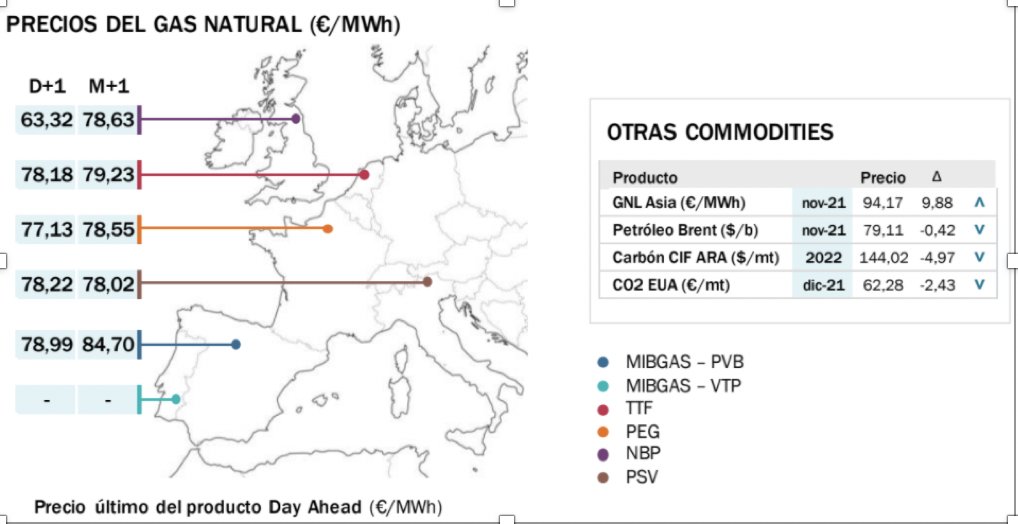
Decarbonisation requires making fossil energy more expensive – that’s the whole purpose of carbon pricing. Well, here we have expensive gas & oil! Will this help the energy transition?
Thread! 🧵✍️
Thread! 🧵✍️

The answer is highly unclear because:
1/ higher energy prices promote efficiency, but...
2/ it is now harder to add more price pressure to consumer bills, and
2/ gas prices have pushed electricity prices up, so the relative price of low-carbon energy has not improved
1/ higher energy prices promote efficiency, but...
2/ it is now harder to add more price pressure to consumer bills, and
2/ gas prices have pushed electricity prices up, so the relative price of low-carbon energy has not improved

2/ Higher electricity prices bring no good news for the environment as the #GreenDeal relies on electrification to decarbonize polluting sectors of the economy
Expensive electricity will delay much needed investments in electric mobility, electric heat pumps, #GreenHydrogen….
Expensive electricity will delay much needed investments in electric mobility, electric heat pumps, #GreenHydrogen….
3/ But, wait…: Why is electricity becoming more expensive if only a small fraction of it is produced with gas? Or, why have electricity prices gone up much faster than costs, leading to huge transfers from consumers to electricity firms? 

4/ It is these transfers, and not only the increase in gas prices, what is truly making electricity prohibitively expensive. By pegging electricity prices to gas prices, this market design is stopping the relative price of electricity from going down 

5/ Carbon pricing has played a key role in power markets but inducing coal-to-gas switching. This is very clear in countries such as UK or Spain, where coal is almost out of the market…
reuters.com/business/energ…
reuters.com/business/energ…
6/ So, why are we seeing coal back on track? Because despite the increase in carbon prices, gas prices have increased much faster: in Europe, it is now cheaper to burn coal than to burn gas
bbc.com/news/business-…
bbc.com/news/business-…
7/ It follows that carbon prices would have to be even higher to push coal back out…but, is there not a vicious circle by which higher carbon prices trigger higher gas demand, which in turn pushes gas prices up, bringing coal back?
8/ Increasing carbon prices is not innocuous as they lead to higher power prices. The increase is not proportional to the carbon content of electricity but to the gas emission rate. Electricity consumers pay for carbon as if the carbon content of electricity was x3 higher! 

9/ As a consequence, investments in renewables reduce the carbon content of electricity and yet (as long as gas remains price-setting) consumers pay the same carbon tax
If consumers do not benefit from low-carbon investments, support for the energy transition will be unlikely
If consumers do not benefit from low-carbon investments, support for the energy transition will be unlikely
10/ Higher carbon prices also lead to higher rents for non-emitting technologies. In some cases these are pure transfers with no incentive effects, i.e. it is difficult to increase nuclear and hydro capacity regardless of their high rents...pouring money with nothing in exchange?
11/ Will today’s high electricity prices push renewables forward, leading to carbon abatement and lower prices?
Is this the pain we have to suffer to reach carbon-free electricity markets?
How long will we have to wait? Will people be patient enough?
bloomberg.com/news/articles/…
Is this the pain we have to suffer to reach carbon-free electricity markets?
How long will we have to wait? Will people be patient enough?
bloomberg.com/news/articles/…
12/ It is unclear whether these high prices will be enough to spur renewable investments… Investors care about future, not current prices, and they are aware that renewables will depress future electricity prices regardless how high they are today
omip.pt/en
omip.pt/en

13/ It is not agreed whether it is optimal to expose renewables to wholesale price volatility, given that their costs are mostly fixed
Uncertainty over future prices (uncorrelated to their costs) raises capital costs, makes renewables more expensive and might delay investments
Uncertainty over future prices (uncorrelated to their costs) raises capital costs, makes renewables more expensive and might delay investments
14/ Renewable auctions for long-term contracts have proved to be effective in fostering investments at low (and stable) prices
If auctions are run by the regulator on behalf of consumers, these lower prices will benefit us all
fitchratings.com/research/corpo…
If auctions are run by the regulator on behalf of consumers, these lower prices will benefit us all
fitchratings.com/research/corpo…
15/ We do not have a problem with carbon pricing, but rather with how electricity market design translates it into higher prices to both clean and dirty electricity, to both contestable and non-contestable technologies
16/ Asymmetric taxation across energies is penalising electricity viz à viz dirtier fuels. We pay a carbon price on electricity as if it were all produced with gas, while the carbon content of gas is (carbon) duty-free
Who will replace her gas boiler with an electric heat pump?
Who will replace her gas boiler with an electric heat pump?
17/ This calls for:
- Broadening carbon pricing to non-ETS sectors
- Putting in place targeted compensation mechanisms to avoid adverse distributional implications, and
- Rethinking electricity market design so that we pay for the carbon content of electricity, and no more
- Broadening carbon pricing to non-ETS sectors
- Putting in place targeted compensation mechanisms to avoid adverse distributional implications, and
- Rethinking electricity market design so that we pay for the carbon content of electricity, and no more
18/ I shared these thoughts today at the panel on “European & International Carbon Markets” of the Conference of the German Economic Association
#VfS_climate #VfS_conference #EUGreenDeal @uni_regensburg @GFelbermayr @EU_Commission @ZEW
Thanks for the invite!
#VfS_climate #VfS_conference #EUGreenDeal @uni_regensburg @GFelbermayr @EU_Commission @ZEW
Thanks for the invite!

• • •
Missing some Tweet in this thread? You can try to
force a refresh




